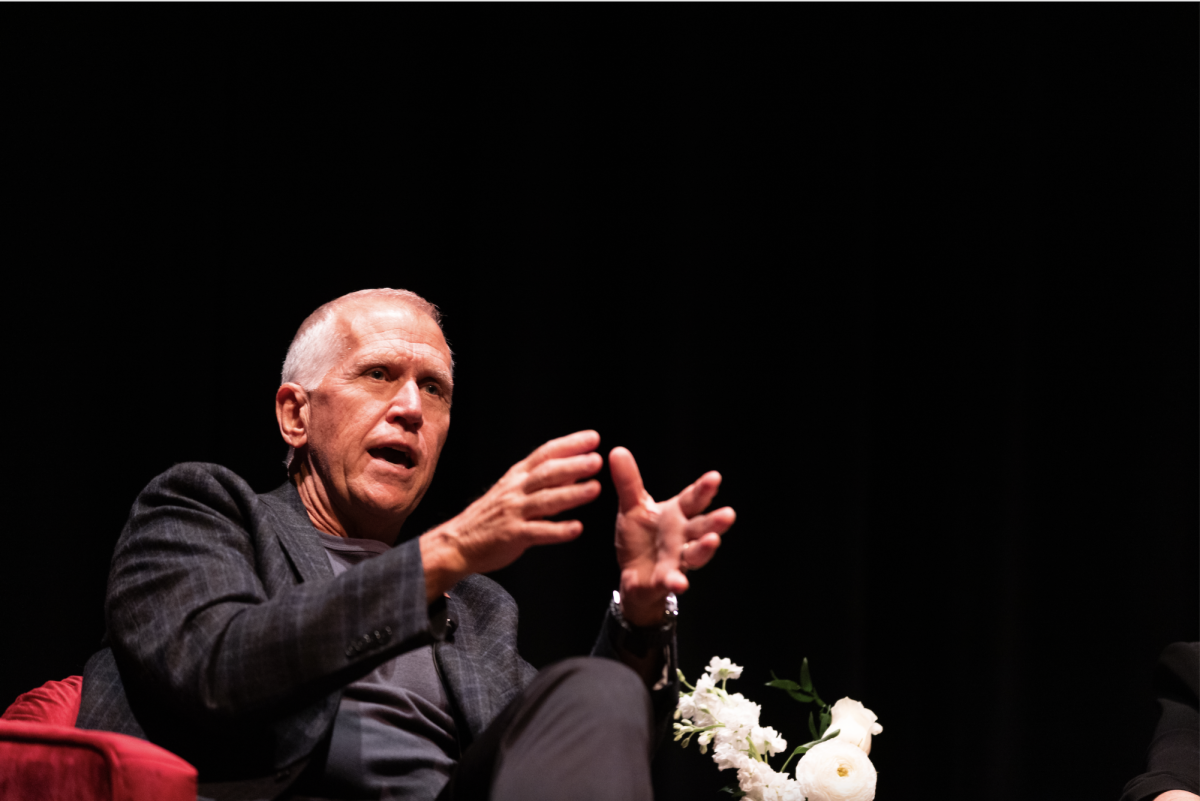
Kaspars Golos
Senator Thom Tillis (R-NC) at the Institute for Public Good's inaugural talk, “Public Good in a Divisive Time."
In 2025, does a grimace and an eye roll prove a sufficient response when an elected official tells a group of students to start having babies? There are myriad conversations to have after the Institute for Public Good’s Oct. 13 moderated discussion, titled “Public Good in a Divisive Time.” But, sitting with a group of my senior friends, just three rows away from Senators Thom Tillis (R-NC) and Amy Klobuchar (D-MN), I found the discussion ended–or at least all that I processed stopped– after Tillis’ call to the crowd in an answer to a question on “public good.”
For the final question, an audience member asked about the scope of public good, and whether it is our community, the United States, or the global world. Wrapping up all the earlier messaging on what the public can do to improve the nation’s political landscape, Tillis implored everyone “to go out there […] to engage,” and then, to my bewilderment, “and, have more babies, guys, thank you.” Met with audience laughs, Tillis’ closing line is easy to gloss over. Yet I feel as though the very core of it must be addressed.
Tillis’ remark was the final word of the conversation, so no audience members could respond. But, I was disappointed not to see any type of redirection or at least an attempt at sheepish clarification from the people on the stage. The prompt called to mind Harrison Butker’s college commencement speech from 2024, where the Kansas City Chiefs’ kicker reduced half of the audience’s purpose in life to having children: “Some of you may go on to lead successful careers in the world. But I would venture to guess that the majority of you are most excited about your marriage and the children you will bring into this world.” Though not as brash, Tillis’s comment mirrored a statement seemingly becoming acceptable in places of education.
Placed at the conclusion of the talk, this call to the students lingers, and perhaps overshadows Tillis’ other stated manners in which students can serve the “public good,” while simultaneously carving out who from the public should be contributing where. Set within the current discourse on reproduction in a post-Dobbs landscape, such a short line from Tillis carries considerable consequence. On an international level, we see rhetoric of women’s education as a threat to birth rates intertwining with immigration policies. The preceding statement to Tillis’ invitation, linked to his views on immigration, sets up a correlation awfully similar to the pronatalism of Viktor Orbán in Hungary. Some may feel I’m grasping onto a throw-away line, but it is the very nature of casualness that strikes me. It’s suddenly acceptable and unchallenged to say such a thing; the only discussions that emerge from it are among my friends and me, wide-eyed on the amphitheater steps of Union, trying to process absurdity in a mask of normalcy.
As Tillis shared his countdown for days left in office, I wonder: will he spend the rest of his days as a senator advocating for safeguards against maternal mortality–rates that disproportionately affect Black women in the state of North Carolina? Will he protect the operation of rural hospitals? Will he tighten gun control to protect those babies from being killed once they go to preschool?
With the same logic of public good in exchange for personal security that Tillis employed, I would like to invert that dynamic. What do you position as the family’s gain for this proposed public good? Where is the advocacy beyond birth? And if the logic does not hold for public good there– a throwaway line isn’t just that. It’s a discrepancy when one can’t uphold this reasoning across all people or relationships to the “public.”
It feels crazy that I need to write an article that has already been written before in many forms from 50 years prior. It feels crazy that this article is so glaringly second-wave given all of the nuance and intersections of other topics covered during the talk. But if Tillis is willing to employ such a blatantly retrograde call, I might as well meet the moment with a glaringly obvious response.